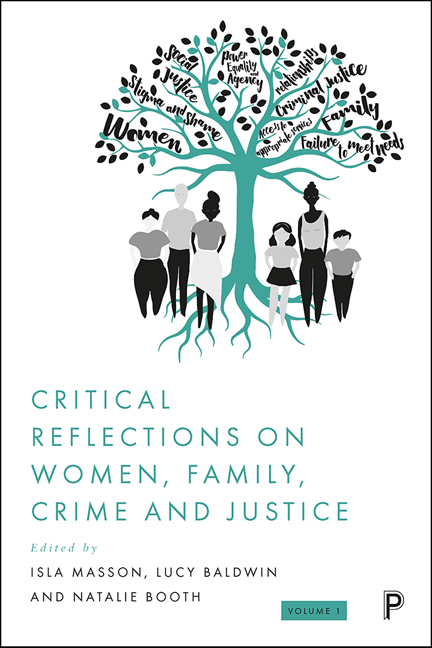Book contents
- Frontmatter
- Contents
- List of figures
- Notes on the contributors
- Acknowledgements
- Foreword: critical reflections from the Women, Family, Crime and Justice network
- 1 Starting the conversation: an introduction to the Women, Family, Crime and Justice network
- 2 Playing the game: women and community punishment
- 3 Harmful social and cultural practices that exist within South Asian communities in the UK and their impact on women
- 4 Exploring shame, love and healing within women’s recovery: an analysis of a trauma-specific intervention
- 5 Reducing the enduring harm of short terms of imprisonment
- 6 ‘Without it you’re lost’: examining the role and challenges of family engagement services in prisons
- 7 What are the challenges and opportunities for schools in supporting children of people in prison?
- 8 Impact and engagement work in the context of families of people in prison
- 9 Presence, voice and reflexivity in feminist and creative research: a personal and professional reflection
- 10 Service users being used: thoughts to the research community
- 11 Continuing the conversation: reflections from the Women, Family, Crime and Justice network
- Index
2 - Playing the game: women and community punishment
Published online by Cambridge University Press: 21 December 2021
- Frontmatter
- Contents
- List of figures
- Notes on the contributors
- Acknowledgements
- Foreword: critical reflections from the Women, Family, Crime and Justice network
- 1 Starting the conversation: an introduction to the Women, Family, Crime and Justice network
- 2 Playing the game: women and community punishment
- 3 Harmful social and cultural practices that exist within South Asian communities in the UK and their impact on women
- 4 Exploring shame, love and healing within women’s recovery: an analysis of a trauma-specific intervention
- 5 Reducing the enduring harm of short terms of imprisonment
- 6 ‘Without it you’re lost’: examining the role and challenges of family engagement services in prisons
- 7 What are the challenges and opportunities for schools in supporting children of people in prison?
- 8 Impact and engagement work in the context of families of people in prison
- 9 Presence, voice and reflexivity in feminist and creative research: a personal and professional reflection
- 10 Service users being used: thoughts to the research community
- 11 Continuing the conversation: reflections from the Women, Family, Crime and Justice network
- Index
Summary
Introduction
It perhaps seems frivolous to consider the serious subject of how women experience punishment as simply ‘playing a game’. The experiences of criminalised women are varied and complex, often dictated by a woman's intersectional position within society (Clarke and Chadwick, 2017). Yet by grouping together those aspects of criminalised women's experiences that are shared, we can begin to understand how criminalised women's lives are shaped by institutions of social control and structures of punishment. Conceptualising these shared experiences through a boardgame, allows the subjugated experience of navigating community punishment as a criminalised woman to be conveyed to academic researchers, criminal justice practitioners, policy makers and students in ways that are easily understood. By placing knowledge of experiences that are far outside our own realm of understanding into the simplistic framework of a boardgame, we can make what is hidden, visible.
This chapter narrates the findings of a piece of feminist participatory action research (Harding, 2018; Harding, 2020b) completed with criminalised women in the North West of England. Using creative methods such as creative writing, photography (photo voice and photo elicitation) and narrative map making, this research aimed to capture the way in which punishment intersects with women's daily lives. In order to communicate the findings of this research to multiple audiences, a research-informed boardgame was produced that was later used as a tool to communicate women's lived experiences of community punishment to probation practitioners at the ‘Women in NAPO conference’ in 2018. While the simplicity of a boardgame contrasts with the complexity of criminalised women's experiences, its accessibility can act as a starting point to consider how these experiences can challenge, unsettle and disrupt existing understandings of how criminal justice punishes women and how criminological researchers theorise those at the margins of the criminal justice system – understanding women's navigation of community punishment as playing a rigged game.
Examining criminalised women is not a new endeavour. Heidensohn (1968; 1985; 2012) has highlighted the importance of understanding criminalised women across her long career, while Smart (1977) first called for more attention to be paid to the female experience in the late 1970s. Since then, the multiple works of Carlen (1983; 1985; 1989; 1998) and Carlen and Worrall (2004) have led the way in critically understanding women in prison.
- Type
- Chapter
- Information
- Critical Reflections on Women, Family, Crime and Justice , pp. 11 - 34Publisher: Bristol University PressPrint publication year: 2021

